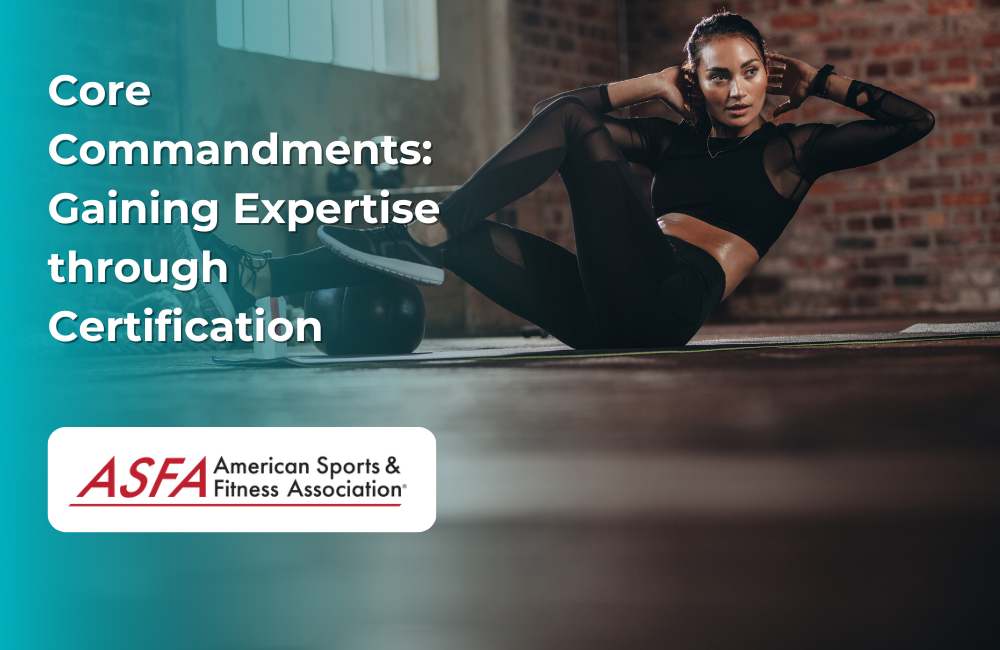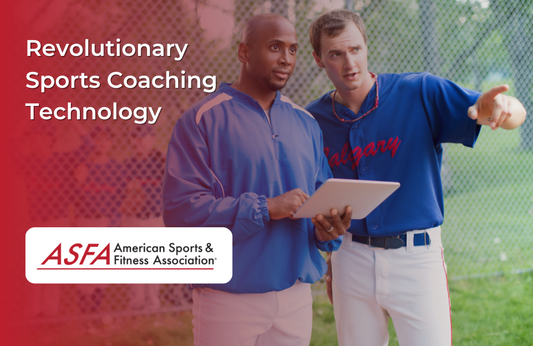In the expansive world of fitness and wellness, there exists a foundational practice that underpins strength, stability, and overall physical vitality: core training. “Core Commandments: Gaining Expertise through Certification” is your definitive guide into this transformative realm, offering an in-depth exploration for those aspiring to become certified core fitness experts. This program provides a comprehensive approach to mastering the essentials of core fitness, equipping you with the tools, knowledge, and skills that matter in career development and the workplace.
Understanding the Core: The Body's Powerhouse
The core, often described as the body's powerhouse, is far more than just the abdominal muscles; it is the central hub of physical strength, stability, and movement. This complex network of muscles includes not only the abdominals but also the lower back, pelvic floor, hips, and glutes. Together, these muscles form the foundation for nearly every movement we perform—from everyday tasks to high-performance athletic activities. Becoming an expert in core training is about more than developing washboard abs; it's about gaining a profound understanding of the core's critical role in overall health, fitness, and functional movement.
For aspiring core fitness experts, this journey represents a deep dive into the science and art of core training. You will learn to see the core not merely as a collection of muscles to tone but as a vital component of the body that, when trained correctly, can enhance every aspect of physical performance and well-being.
The Importance of Core Training Certification
Earning a certification as a core fitness expert provides you with the essential knowledge and skills to guide individuals toward unlocking their true physical potential. This certification journey is an immersive experience that covers the intricacies of core anatomy, the principles of functional movement, and the importance of proper core engagement and stability in everyday life and athletic endeavors. Your role as a certified expert will be to help others achieve greater strength, stability, and overall vitality by applying evidence-based practices and innovative training techniques.
Core Training: Beyond Aesthetics to Functional Excellence
At its essence, core training is not just about the aesthetic appeal of a strong midsection; it is fundamentally about the functional and performance benefits a well-trained core provides. As we progress through this journey, you'll discover how a strong core can improve posture, reduce the risk of injury, and enhance athletic performance across all levels and disciplines. As a certified core fitness expert, your influence will extend beyond the gym, making a meaningful and lasting impact on your clients' lives by promoting a strong, resilient, and well-functioning body.
Diving Deep into Core Commandments: Key Learning Outcomes and Skills
Throughout our exploration of core commandments, we will:
-
Examine Foundational Principles: Delve into the foundational principles of core training, including biomechanics, core anatomy, and the physiological functions of core muscles.
-
Understand Core Anatomy and Functions: Gain a detailed understanding of the core's anatomy, focusing on how each muscle group contributes to overall stability and movement efficiency.
-
Master Exercise Selection and Form: Learn how to select appropriate core exercises and master proper form to ensure safety and effectiveness in training.
-
Design Personalized Core Workouts: Explore how to create well-rounded and personalized core workouts tailored to meet each client's unique needs, goals, and fitness levels.
-
Develop Coaching and Cueing Skills: Improve your coaching skills by learning effective cueing techniques and progressions for core exercises, ensuring clients engage the right muscles and maintain proper form.
Structuring Core Fitness Sessions
In the following sections, we will provide comprehensive guidance on how to structure core fitness sessions that are both effective and engaging:
-
Program Design and Structure: Learn to design core fitness programs that are balanced, progressive, and goal-oriented. We'll explore how to structure sessions that incorporate a variety of core exercises targeting different muscle groups.
-
Effective Cueing Techniques: Develop the ability to provide clear and concise cues that enhance client understanding and performance. Proper cueing helps clients engage the right muscles and maintain correct posture throughout each exercise.
-
Modifications and Progressions: Understand how to modify exercises for participants with different fitness levels and abilities. Learn to progress exercises safely to challenge advanced clients while offering alternatives for beginners or those with limitations.
-
Functional Application of Core Training: Apply core training principles to functional movement patterns. This includes understanding how to integrate core stability and strength into daily activities and sport-specific movements.
Part 1: Understanding Fitness Certification
Fitness certification is a formal recognition of your expertise and competence in various aspects of fitness, including exercise science, program design, nutrition, and coaching techniques. It signifies your commitment to promoting health, safety, and well-being through structured fitness programs.
Part 2: Steps to Achieve Fitness Certification
-
Research Certification Organizations: Begin by researching reputable certification organizations that are well-recognized in the fitness industry. These organizations should be recognized and respected, aligning with your specific career goals, whether you aim to specialize in personal training, group fitness instruction, nutrition coaching, or another area.
-
Choose the Right Certification: Select a certification that matches your career aspirations and interests. Options range from general fitness certifications to more specialized credentials in areas like strength and conditioning, yoga instruction, or sports nutrition.
-
Enroll in a Certification Program: Once you've selected the appropriate certification, enroll in the program. Certification courses are offered in various formats—such as in-person, online, or blended learning—to accommodate different learning styles and schedules.
-
Study and Prepare Thoroughly: Dedicate time to studying the materials provided in the certification program. Key topics typically include exercise physiology, program design, safety guidelines, nutrition, and effective coaching techniques.
-
Gain Practical Experience: Acquire hands-on experience by working with clients, participating in internships, or leading fitness sessions. Practical experience is crucial for applying theoretical knowledge and developing real-world coaching skills.
-
Take the Certification Exam: Register for and successfully complete the certification exam. The exam assesses your understanding of fitness principles, program design, coaching strategies, and safety protocols.
-
Maintain Your Certification: After becoming certified, maintain your credentials by fulfilling continuing education requirements. This often involves taking additional courses, attending workshops, or earning continuing education credits to stay updated with the latest industry trends and guidelines.
Choosing the Right Certification
Choosing the right certification can be a crucial step in gaining expertise and advancing your career. With so many certifications available, it can be overwhelming to decide which one is right for you. Here are some tips to help you choose the right certification:
-
Align with Your Goals: Consider what you want to achieve with your certification. Are you looking to gain expertise in a specific area or industry? Do you want to advance your career or switch to a new field? Choose a certification that aligns with your goals and aspirations.
-
Research the Certification: Look into the certification’s reputation, curriculum, and requirements. Check if it’s if it’s recognized by employers in your industry. This ensures that the certification you pursue will be valued and respected.
-
Consider the Level of Expertise: Choose a certification that matches your level of expertise. If you’re new to a field, consider an entry-level certification. If you’re already experienced, consider an advanced certification that can further enhance your skills and knowledge.
-
Look at the Benefits: Consider the benefits of the certification, such as increased earning potential, improved job prospects, and access to exclusive resources and networks. A well-chosen certification can open doors to new opportunities and career advancements.
-
Check the Requirements: Make sure you meet the certification’s requirements, such as education, experience, and training. Understanding these prerequisites will help you prepare adequately and increase your chances of success.
Some popular certifications that can help you gain expertise include:
-
Project Management Professional (PMP): A certification for project managers that demonstrates expertise in project management techniques and best practices.
-
Certified Information Systems Security Professional (CISSP): A certification for IT professionals that demonstrates expertise in information security and risk management.
-
Certified Marketing Professional (CMP): A certification for marketing professionals that demonstrates expertise in marketing strategy and tactics.
By carefully selecting the right certification, you can gain the expertise needed to achieve your career goals and stand out in your field.
Part 3: Specializations and Advanced Certifications
Consider pursuing additional specializations or advanced certifications to further refine your expertise in specific areas of interest. These might include:
-
Strength and Conditioning: Focus on advanced techniques for optimizing strength and enhancing athletic performance.
-
Yoga or Pilates Instruction: Specialize in mind-body fitness practices that emphasize flexibility, balance, and core strength.
-
Nutrition Coaching: Expand your expertise in nutrition and dietary planning to offer comprehensive guidance to clients.
-
Sports-specific Training: Develop specialized skills to train athletes in various sports, tailoring programs to enhance sport-specific performance.
Part 4: Understanding the Business Aspects of Fitness
To succeed as a core fitness professional, it is essential to understand the business aspects of the industry. This includes:
-
Liability Insurance: Understanding the importance of liability insurance to protect yourself from potential legal claims.
-
Client Waivers and Informed Consent: Ensuring that all clients complete waivers and informed consent forms to mitigate risks and set clear expectations.
-
Ethical Considerations: Adhering to ethical guidelines when providing fitness services, ensuring client safety, and promoting professionalism.
Part 5: The Importance of Continuing Education
Staying current with the latest trends, research, and techniques in fitness is critical for maintaining your competitive edge as a core fitness expert. Recognizing new possibilities for growth and adaptation in your expertise is essential, as what contributed to your past success may not suffice in the future. Engaging in continuing education opportunities, such as workshops, seminars, or advanced certifications, helps you stay informed and up-to-date.
Preparing for the Future
Preparing for the future is essential for gaining expertise and staying ahead in your career. Here are some tips to help you prepare for the future:
-
Stay Up-to-Date with Industry Trends: Stay informed about the latest developments and trends in your industry. Attend conferences, read industry publications, and follow thought leaders on social media. This continuous learning will keep you at the forefront of your field.
-
Develop New Skills: Continuously develop new skills and knowledge to stay relevant in your field. Consider taking courses, attending workshops, or pursuing certifications. Expanding your skill set will make you more adaptable and valuable in the ever-evolving job market.
-
Network and Build Relationships: Build relationships with people in your industry and network with others who share similar interests and goals. Networking can provide you with new ideas, opportunities, and support as you advance in your career.
-
Set Goals and Create a Plan: Set goals for your career and create a plan to achieve them. Break down your goals into smaller, manageable steps, and track your progress. Having a clear roadmap will help you stay focused and motivated.
-
Be Adaptable and Open to Change: Be prepared to adapt to changes in your industry and be open to new ideas and perspectives. Flexibility and a willingness to embrace change are crucial for long-term success.
Some ways to prepare for the future include:
-
Staying Curious: Stay curious and keep learning. Read books, articles, and blogs to stay informed about the latest developments in your industry. Curiosity will drive your continuous growth and innovation.
-
Experimenting with New Technologies: Experiment with new technologies and tools to stay ahead of the curve. Embracing technological advancements can give you a competitive edge.
-
Building a Personal Brand: Build a personal brand by creating a professional online presence, including a website or blog, and engaging with others on social media. A strong personal brand can enhance your credibility and visibility.
-
Seeking Out Mentorship: Seek out mentorship from experienced professionals in your industry who can provide guidance and support. Mentors can offer valuable insights and help you navigate your career path.
By following these tips, you can gain expertise and prepare for the future. Remember to stay focused, adaptable, and committed to your goals, and you’ll be well on your way to achieving success in your career.
Part 6: Launching Your Career as a Core Fitness Expert
Upon achieving your certification, you are ready to launch your career as a fitness professional. This involves:
-
Developing Tailored Fitness Programs: Designing customized fitness programs that cater to the specific needs and goals of your clients.
-
Effective Coaching and Motivation: Coaching clients effectively, providing motivation and support to help them achieve their fitness aspirations.
-
Building a Client Base: Establishing a strong client base by demonstrating your expertise and delivering exceptional training experiences.
Earning your fitness certification positions you as a knowledgeable and credible fitness expert who is equipped to guide others towards improved health and well-being. By following the steps outlined in this guide, gaining practical experience, and staying abreast of the latest fitness developments, you can establish yourself as a respected professional who empowers clients to achieve their fitness goals.
Conclusion: Embrace the Journey of Core Fitness Expertise
Gaining expertise in core fitness through certification is a transformative journey that empowers you to become a skilled instructor capable of helping others enhance their core strength and overall fitness. As this guide highlights, obtaining certification as a core fitness instructor offers numerous advantages:
-
Professional Credibility: Certified instructors are recognized for their expertise in core-specific exercises, program design, and coaching techniques, attracting clients seeking high-quality and results-driven workouts.
-
Dynamic and Effective Training: Certification equips instructors with the knowledge to create dynamic, efficient, and safe core-focused sessions, ensuring proper form and progression for participants of all fitness levels.
-
Commitment to Continuous Learning: Certification programs emphasize the importance of continuous learning and professional development, encouraging instructors to stay updated with the latest trends, innovations, and safety guidelines.
-
Accessibility for All: Core fitness instructor certification programs are designed to accommodate individuals with varying experience levels, making them accessible to all who aspire to lead core fitness classes.
By recognizing the importance of gaining expertise through core fitness instructor certification, enrolling in recognized programs, and continually honing your skills, you can become a highly effective core fitness instructor. Inspire your clients to improve their core strength and overall fitness, and make a significant contribution to the health and vitality of your community through core-focused workouts.
Embrace this opportunity to elevate your career and make a lasting impact on the lives of others by becoming a certified core fitness expert. Your journey begins here, with the core commandments guiding your path to excellence in the world of fitness.





